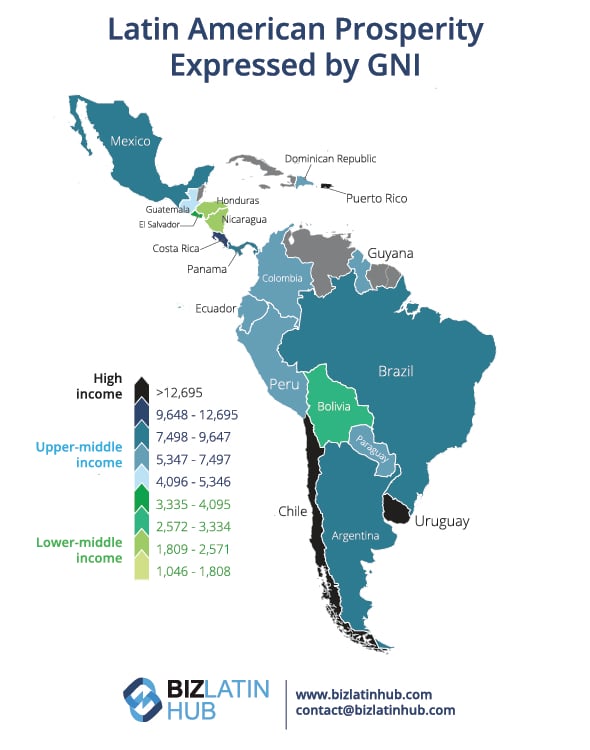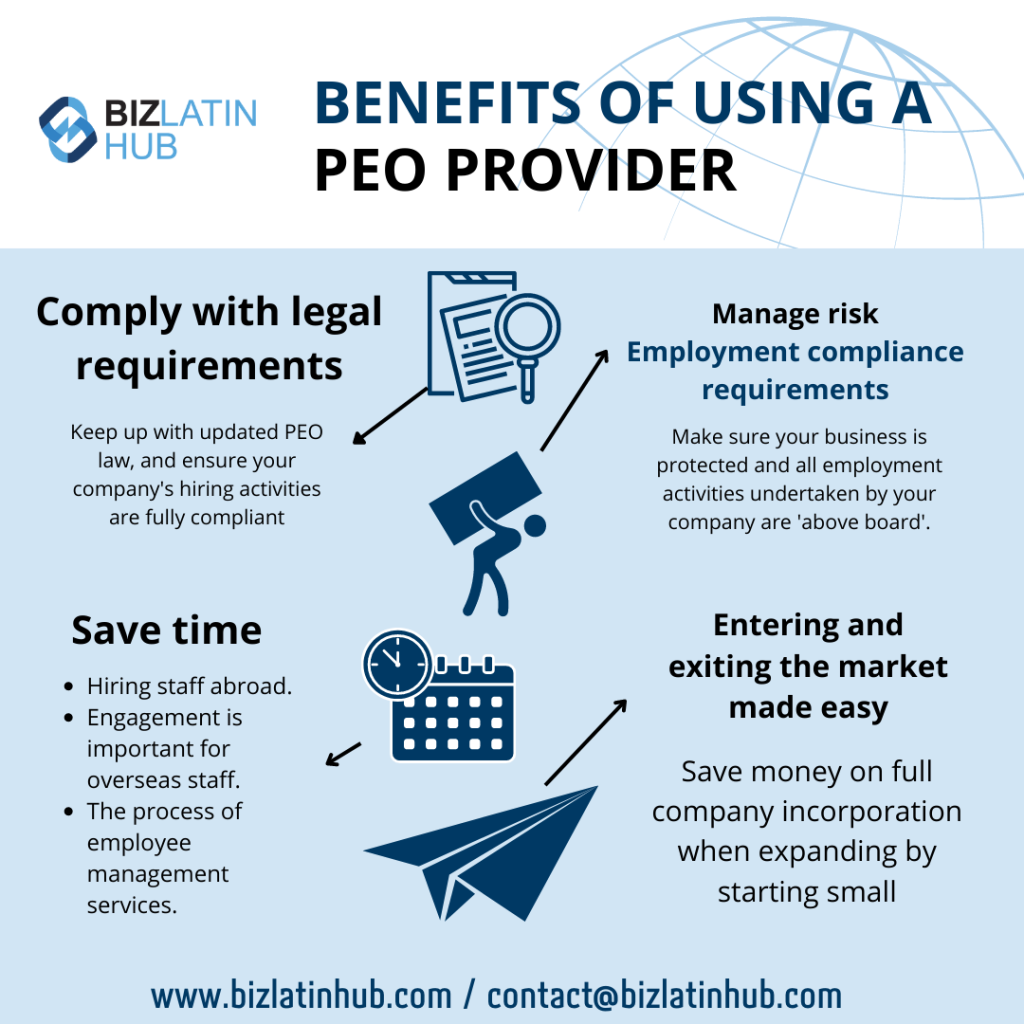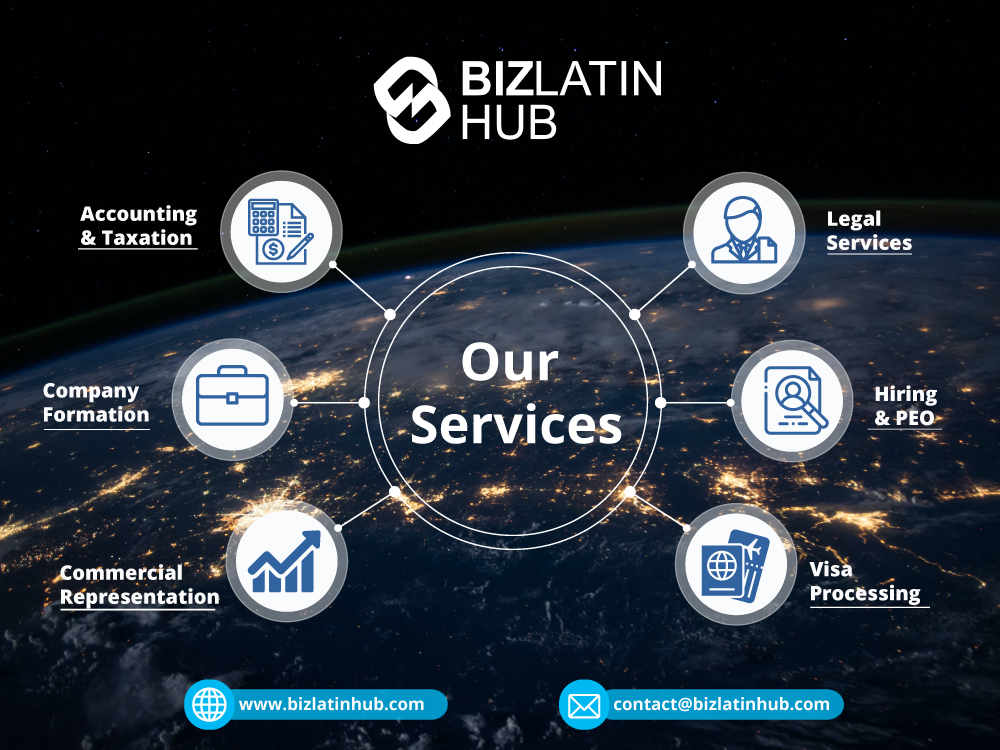
We are living in the Age of Information. The focus of the global economy has shifted from industry-oriented to service-oriented. Thanks to the rapidly growing information flow and an ever-present internet access, it has become extremely easy to interact with people, companies, and governments around the globe. That’s why an increasing number of people are looking to hire staff in Latin America.
Traditionally, Latin American markets have been reliant on agriculture and on the extraction of natural resources. However, in recent years, these have begun to be substituted for industrial production and services. As a result, increasing amounts of foreign direct investments come to hire staff in Latin America in these fields.
Biz Latin Hub can help you hire staff in Latin America, either through PEO services or directly. PEO services act as an intermediary employer for you within a country, allowing you to enter the market efficiently and quickly. With 18 dedicated offices all across the region, no one knows Latin America and the Caribbean quite like us. From PEO services to direct hiring, our array of back office services can help you out, whatever you want to do.
Trade Agreement Memberships
The governments in Latin American countries are aiming to attract new foreign investors in order to boost their local economies. To assure a smooth flow of international trade, they have signed new trade deals and agreements. For example, Chile, Mexico, and Peru became a member of the Comprehensive and Progressive Agreement for Trans-Pacific Partnership (CP TPP).
This ambitious trade agreement connects 11 countries along the Pacific Ocean who all expressed their interest in generating greater economic growth, enhancing employment and increasing ties in the region. In addition to this, the European Union is negotiating a new trade deal with the founding members of MERCOSUR, namely, Argentina, Brazil, Paraguay, and Uruguay to facilitate the trade. After a pause of negotiations in 2012, the countries relaunched this debate in 2016.
Qualified workforce for sustainable growth
Undoubtedly, a destination can only be attractive for foreign investors in the long-term if it possesses a qualified workforce. According to the World Economic Forum, 36% of firms from OECD countries had difficulties in finding an adequate workforce. In the case of Latin America, these figures reached around 50%.
The good news is that local governments are aware of this and have taken relevant measures to try and tackle this problem. For instance, Chile and Brazil are beginning to invest in labor information systems to detect any labor skill shortages. Mexico, on the other hand, introduced a dual education model connecting universities and industries. Meanwhile, Argentina has been officially recognized as having a high level of English proficiency.
Company Formation vs. Professional Employer Organisation
Entering a new market brings many opportunities, but also many risks. As a foreign investor, you have various opportunities on how to enter a new market. You can decide on incorporation and establish a legal entity in a foreign country or, there is an easier option. You can decide to cooperate with a local company called a PEO (Professional Employer Organisation) and outsource some of the HR workloads, meaning that you can fully concentrate on your core business. A qualified workforce and efficient human resources management are indispensable to guaranteeing strong business development.
So, what exactly does a PEO mean?
A Professional Employer Organization is a form of partnership in co-employment between a foreign entity and a local company. Basically, it refers to the outsourcing of certain HR activities such as payroll processing, employer’s benefits or employment contract administration to a third party which is present in a local market and possesses the knowledge about local employment law. By reaching out to a local PEO partner, you can diminish any risk that stems from a lack of knowledge of specific employment regulations of the country and at the same time, you can gain more time to focus on your crucial business activities.
In this case, the company and a PEO partner share responsibility for workplace safety, labor law compliance, and negotiation of benefit plans. The most common services provided by PEO companies include:
- Payroll processing
- Managing paperwork for hiring new employees
- Assuring compliance with local employment law regulations
- Managing employees’ benefits and health insurance plans
- Managing worker’ compensation and retirement savings plans
What are the benefits of using a PEO to hire staff in Latin America?
The models of cooperation with local PEO partner are on the increase for multiple reasons. The major benefits of opting for this model are the following:

- Cost saving– Establishing a legal entity can require a lot of time and money. Strong local market knowledge is essential for incorporation as well as Human Resources Management. By involving a local partner in HR issues, you save time and money on all employment-related issues from hiring process up to payroll processing. PEO companies usually also provide better opportunities for employees in terms of health coverage programs.
- Risk protection- Without the sufficient knowledge of local employment law, you can very easily make a mistake in running your business. In fact, more than 33% of small companies get fines for making payroll mistakes. The PEO company guarantees compliance with the local law and thus mitigates the risk.
- Time- If you are a small or medium-sized company, you probably do not want to invest a lot of time into the payroll and employment paperwork. By outsourcing these services, you gain the freedom to focus on your principal business activities and focus on your market expansion.
FAQs on how to hire staff in Latin America
Yes, in most countries in the region it is possible for a company to be 100% foreign owned.
Cost saving– Establishing a legal entity can require a lot of time and money. Strong local market knowledge is essential for incorporation as well as Human Resources Management. By involving a local partner in HR issues, you save time and money on all employment-related issues from hiring process up to payroll processing. PEO companies usually also provide better opportunities for employees in terms of health coverage programs.
Risk protection- Without the sufficient knowledge of local employment law, you can very easily make a mistake in running your business. In fact, more than 33% of small companies get fines for making payroll mistakes. The PEO company guarantees compliance with the local law and thus mitigates the risk.
Time- If you are a small or medium-sized company, you probably do not want to invest a lot of time into the payroll and employment paperwork. By outsourcing these services, you gain the freedom to focus on your principal business activities and focus on your market expansion.
You do not have to pay any fees to the PEO company and you will be protected against any changes in the law that may come in the future. Also, direct hires are more likely to develop a close connection to the company culture.
Yes, absolutely. Many of our clients start out using PEO as it is faster in the initial stages, then later establish a company and hire directly using that company.
Biz Latin Hub can help you hire staff in Latin America
In general, cooperating with a local PEO company brings more advantages than disadvantages. Nevertheless, it is inevitable that while PEO will help you to lessen your administrative burden, at the same time you may lose an overview of the employment strategy of your company. We can also help you hire staff in Latin America to work full time as employees if that is what you need.
Cooperation with PEO companies provides the largest benefits for small and medium-sized companies. Also, a smooth expansion into a foreign market is easier and cheaper with a PEO partner. You do not have to worry about hiring a lawyer to help you with local employment law nor about research which procedures and rules you need to comply with regarding employees’ remuneration.
If you want to find out how to contact a local PEO company, you are in a right place. Biz Latin Hub has offices in all key Latin American jurisdictions and this is a perfect provider for PEO services in this region.
Feel free to contact us now to receive personalized support.






